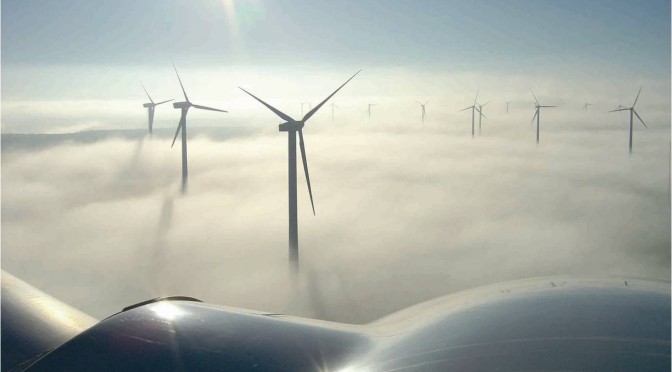An impressive and thoughtful opinion piece on wind power by Andy Robinson of Plainfield, Vt., appeared on the independent news website Vermont Digger recently.
A few months ago, crossing the Columbia River from Washington to Oregon, I found myself in the middle of a huge wind farm – hundreds and hundreds of turbines turning above a rolling landscape of farm fields and sagebrush. I drove for nearly an hour through this landscape, wind towers to the horizon in every direction.
I will admit that I found them beautiful.
Driving through the Pacific Northwest, I thought about the “wind wars” back home in Vermont, and all the people I know and admire on all sides of this debate. The arguments about wind are partly about aesthetics, but also about habitat: is it worth fragmenting our forests in the interest of producing energy? This is an important question, but I’ve noticed an undertone that makes me uncomfortable: the idea that our landscape is somehow more special than others, and therefore more worthy of protection.
I don’t know enough science to compare the biodiversity of a Vermont ridgeline to the sagebrush hills eastern Oregon – a landscape filled with deer, elk and bald eagles – but this is what I know:
• Across Appalachia, mountaintops are being blown apart for coal, and this “mountaintop removal” mining is destroying entire ecosystems and communities. Some of that coal is burned for electricity by New England utilities – and once it enters the New England grid, that electricity is in used Vermont.
• Natural gas “fracking” threatens groundwater in Pennsylvania and other eastern states. Fracking was just banned in Vermont – a huge step forward – yet some of the gas produced elsewhere is burned for electricity by New England utilities. Once it enters the New England grid, that electricity is used in Vermont.
• Hydro Quebec’s dams have flooded vast valleys in northern Quebec, destroying hundreds of square miles of pristine forest and forcing the relocation of several indigenous communities, threatening their way of life. This electricity is sold directly to Vermont utilities; it comprises about one-third of what we use in our state.
What are we willing to sacrifice? Is it worth giving up a Vermont ridgeline so that one less valley will be flooded in Quebec, or one less mountaintop destroyed in West Virginia, or one less well drilled in Pennsylvania?
Except for the few who live off the grid and generate their own power, we are all complicit when we flip on the lights. Vermont may feel like a precious island – one that we strive mightily to protect – and yet we are connected to the rest of the world in many invisible ways. Unlike a wind tower on a local ridgeline, it’s easy to ignore what we can’t see from home, like the rising oceans that flood island nations in the Pacific and wheat fields in Bangladesh.
Like it or not, we benefit from the sacrifices that others have already made, are making today, or will make very soon. With the possible exception of Vermont Yankee – a radioactive cleanup project we will hand to our children and their children – we accept the benefits but outsource the costs to others.
What are we willing to sacrifice? Is it worth giving up a Vermont ridgeline so that one less valley will be flooded in Quebec, or one less mountaintop destroyed in West Virginia, or one less well drilled in Pennsylvania? Are we willing to use less – much less – energy while paying more for what we use? Are we willing to shift our definition of beauty?
My family strives to do the right thing. We insulated our house, installed a solar hot water system on the roof, and heat our home with wood. We grow a lot of our own food and support local farmers. We share one car. We use about one-third the electricity of a typical Vermont household. None of these things feels like a great sacrifice.
Yet I make my living flying back and forth across the continent, and probably the worst thing you can do for the climate is to get on an airplane. Ironically, many nonprofits that hire me are working to protect the earth against the impacts of climate change. At one end of my Northwest trip I worked with a river protection group; at the other end, a network of conservation land trusts. En route, I burned a lot of hydrocarbons.
I am still searching for the right level of sacrifice in my own life. I suspect it will require far less travel, a lower income, and even less consumption. Like many of my colleagues and neighbors, I believe we should prioritize local energy production and conservation over commercial wind farms.
But I also know this: If I looked up and saw a wind turbine on the ridge beyond my back yard, it would remind me that other people, other communities, and other ecosystems are bearing much higher costs than we are. And I would willingly accept it as our share of the burden.
http://vtdigger.org/2013/01/17/robinson-at-home-with-the-wind/


